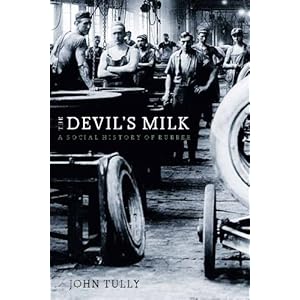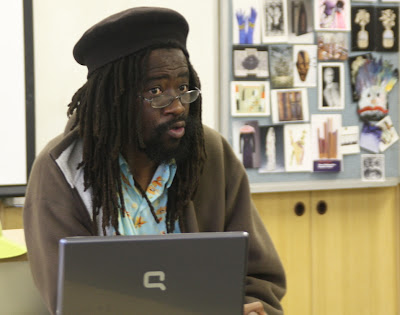The revolution is the people of Libya’s to make

Anti-regime protest in Bengazi.
[See also "Libya: How Gaddafi became a Western-backed dictator". For more coverage of Libya, click HERE.]
By Peter Boyle
March 13, 2011 -- Green Left Weekly -- Saif al-Islam, the billionaire son of Muammar Gaddafi who was the neoliberal darling of Western governments until only recently, boasted in a March 10 interview with Reuters that forces loyal to his family were now on the offensive against rebel forces.
NATO, for its part, has decided against military intervention — for the time being. However, France became the first government to recognise the rebel Interim Transitional National Council (ITNC) set up in Benghazi on March 5. AFP reported that France's President Nicolas Sarkozy has also proposed “targeted air strikes” on Libya.
`Coolie revolts': exclusive excerpt from 'The Devil's Milk: A social history of rubber'

The Devil’s Milk: A social history of rubber
By John Tully
Monthly Review Press, 2011
March 13, 2011 -- With the kind permission of Monthly Review Press, Links International Journal of Socialist Renewal is honoured to be able to bring its readers an exclusive excerpt from Australian socialist John Tully's fascinating new book, The Devil’s Milk: A social history of rubber. The section below details how the peoples of the colonies exploited by the imperialist rubber barons fought back against their oppression. Links readers are urged to purchase a copy of this excellent new book. See also an interview with John Tully about his new book, "New book reveals the history of rubber: holocausts, environmental destruction and class struggle".
Give Israel the South African treatment

“I am a black South African, and if I were to change the names, the description of what is happening in the Gaza Strip and the West Bank would be a description of what is happening in South Africa” - Archbishop Desmond Tutu, New York 1989.
By Antony Loewenstein & Moammar Mashni
March 6, 2011-- Green Left Weekly -- When Desmond Tutu made this comment, the South African apartheid regime was still in power. In 1994, after 45 years of racial segregation, the apartheid era was officially over. When watershed moments like this occur, multiple factors can be attributed. But history is clear that one of the many reasons this tyranny finally succumbed was an international boycott, divestment and sanctions campaign (BDS).
[Below is the transcript of Sinn Féin president and newly elected member of parliament Gerry Adam's first speech to Ireland's parliament (video above), on March 9, 2011.]
By Gerry Adams
March 9, 2011 -- I am very proud to stand here as an Ulsterman, as an Irish republican from County Antrim. It is a great honour to represent Sinn Féin in any capacity but it is especially gratifying to receive a mandate from one’s peers.
The United Left Alliance's Joe Higgins' first speech in the Dáil on March 9, 2011. Transcript here.
March 9, 2011 -- United Left Alliance -- At the March 8 press conference convened by the United Left Alliance in response to the program for government agreed by Fine Gael and Labour Joe Higgins, Socialist Party/United Left Alliance TD [MP] for Dublin West said:
As we predicted, despite the media palaver about Fine Gael and [the] Labour [party] being incompatible they rapidly split the minute differences in their respective manifestos and have presented the public with essentially a continuation of the Fianna Fáíl/Green Party/IMF cuts program.
Tied in the straightjacket of cuts and austerity, the policies of this government mean more unemployment, more emigration, more stealth taxes and more transferring of wealth from taxpayers to failed banks and greedy bondholders. Scarcely any demands are being asked off the wealthy to pay for the crisis they created.

* * *
By Ashley Fataar

March 9, 2011 -- Links International Journal of Socialist Renewal -- International left organisations continue to express their solidarity with the Libyan people as they struggle to throw off the Western-backed dictatorship of Muammar Gaddafi. At the same time, they are rejecting moves by Western imperialism for military intervention to hypocritically take adavantage of the situation and try to reestablish a bridgehead in the oil-rich region. Below are statements by the Labour Party Pakistan, the US-based Kasama Project, the Congress of South African Trade Unions and the South African Municipal Workers Union. See also the statements by the Socialist Party of Malaysia and the Socialist Alliance in Australia. More will be posted as they come to hand.
* * *
Support the Libyan people! No imperialist intervention in Libya!
Labour Party Pakistan statement on Libya
Climate change: Rupert Murdoch’s 'Australian' peddles damaging bad science

By Renfrey Clarke
March 6, 2011 -- Links International Journal of Socialist Renewal – Readers of Rupert Murdoch’s flagship, the Australian, will have noticed a flurry of self-justifying articles and editorials in recent months, as the editors try to deflect criticism of the newspaper’s global warming coverage. What has the Australian been saying on the topic, and does this measure up to the responsibilities of a major news outlet?In Britain in 1998, the medical science journal The Lancet published a study that claimed to identify a link between the mental disorder autism and the administering to children of the widely used measles-mumps-rubella (MMR) vaccine.
Libya: Gaddafi kills his own people, but Western military intervention is no solution

[See also "Libya: How Gaddafi became a Western-backed dictator". For more coverage of Libya, click HERE.]
By Peter Boyle
March 7, 2011 -- Green Left Weekly -- The dictatorial regime of Muammar Gaddafi has escalated its violence against rebel forces seeking to bring it down. On March 6, opponents of the regime were reported to be in control of a number of cities, especially in Libya’s east. Al Jazeera said on March 4 that anti-government protests in the capital Tripoli had been met with tear gas by security forces. Opponents said Az Zawiyah, a town just 40 kilometres from Tripoli that is home to an oil refinery, was mostly under rebel control.
Thailand: Why the lese majeste law is an abomination

By Giles Ji Ungpakorn
South Africa: The history and character of `black economic empowerment'

Sudan: Urgent call for action on behalf of detained and tortured protesters

The following is a letter template that human rights and democracy activists in Sudan are asking people around the world to use as a basis of a protest letter to be send